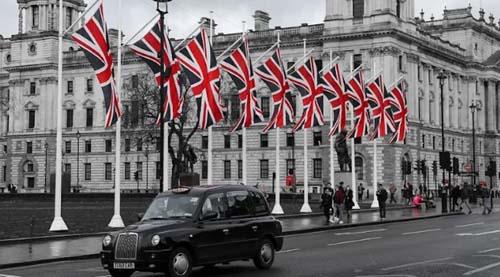
British people are resilient … they’ve had to be
Alistair Burt
The resignation of Liz Truss after just 44 days in office means that by next week the UK will have had three prime ministers in two months, four finance ministers in four months, and for most of 2022 a government working on autopilot thanks only to its hard-working civil service and diplomats.
The British people are exceptionally stoical. Though increasingly worried about the rising cost of food and energy, they get on with their lives and do not march on Parliament. Instead, this past week they watched a livestream of a lettuce, which a combination of the popular press and the erudite weekly “The Economist” had compared with Truss, urging readers to guess whether its shelf life would be longer than the prime minister’s period in office. It was. The contrast between Britain’s elected rulers and the dedicated lifelong service of the late Queen Elizabeth is painful.
The ruling Conservative Party’s parliamentary majority is in theory secure until the end of 2024, but it knows that in practice it is now on borrowed time, and must act swiftly to recover any shred of the credibility it has lost. A quick election timetable will ensure that a new party leader, and therefore prime minister, is in place by Oct. 28 at the latest.
But the mechanics are only part of the story. The truth is that the Conservative Party is riven by ideological fissures that will ensure continuing instability, no matter who leads, unless they are honestly faced and overcome. At their heart are echoes of the Brexit debate, which polarised so many. Those Conservatives who were divided on that issue are equally divided on the detail of the UK’s economic outlook, between small state, free market solutions, and greater intervention to combat social inequalities; on the extent of immigration to fill labor and skills shortages exacerbated by Brexit; and on the relationship with the EU and the concessions that may or may not be required to resolve issues affecting the trade border between the UK and the EU in Ireland.

There is no consensus on an individual leader who might unite competing interests at this time, and the events of the past few months have deepened personal rivalries. In short, the current UK government has only days to resolve these issues to give any chance for a new Conservative prime minister to steady the ship of state and give a sense of stability to the watching financial markets, whose rejection of Truss’s economics hastened her departure.
There is no consensus on an individual leader who might unite competing interests, and the events of the past few months have deepened personal rivalries.
Britain is conscious that this affects how the world sees the country. So what can the world expect from a new British prime minister?
Fortunately, other institutions in the UK are sounder. Its underlying economic strength remains attractive for investors, with a robustly independent Bank of England partly responsible for pressing the tax and spending decisions now being followed by Chancellor Jeremy Hunt, which reassured markets this week. Britain’s research and development base will drive growth in new and established industries, secured in some of the world’s best universities.
Most of the country’s foreign policy commitments look likely to be unaffected by the domestic dramas of Westminster. There is a wide consensus, extending to the opposition parties, on the Russian invasion of Ukraine. Arms will continue to be supplied to Kyiv, and sanctions on Moscow will be increased. There may be a debate on defense expenditure; Truss had intended to increase it from 2.2 percent of GDP to 3 percent by 2030, which the impressive Defense Secretary Ben Wallace has now hard wired into his budget, suggesting that threatening this in an expenditure squeeze would be fiercely resisted. The government had also seemed also on the point of designating China a “strategic threat” to the UK rather than a “systemic competitor.” This opinion may well be followed by Truss’s successor, as it has increasing support in Parliament and through the security services.
In the Middle East, working with the UK’s historical partners will continue, and a long-sought trade deal with the GCC will be pursued. There may however be a different outcome to the review of the location of the British Embassy in Israel. Truss had promised the review as she competed for the leadership of her party, and seemed personally keen on a move from Tel Aviv to Jerusalem. I suspect most of Whitehall felt that the existing arrangements worked well in accordance with international law, and did not affect the relationship with Israel — a view probably reinforced by Australia’s recent reversal of its recognition of Jerusalem as Israel’s capital.
Finally, another of Britain’s institutions is now also working fine. Its democracy depends ultimately on the peaceful transfer of power, and an opposition becoming a “government in waiting.” The Conservative Party has only itself to blame for having played such a substantial part in helping Keir Starmer and the Labour Party to be seen as such.
The writer is a former UK Member of Parliament who has twice held ministerial positions in the Foreign and Commonwealth Office
